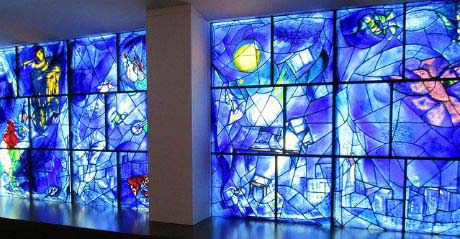The Psychology of Spirituality and the Second Half of Life

“Psychology of spirituality?” some readers will say, “Oh boy, here it comes…“, and I think I understand pretty well what they’re feeling.

by Marc Chagall
Many who were brought up in the confines of conventional organized religion have become quite “allergic” to the language, feeling, sights, sounds and even the smell of traditional religiosity. And, equally, many brought up outside of that kind of religious framework simply don’t feel that it has the credibility to allow them to enter into it. Depth case studies C.G. Jung would be the first to acknowledge that the symbols of conventional religion have lost much of their power, and their ability to influence the psyches of a great number of people in our culture.
That’s exactly why I decided to use the word “spirituality”, rather than “religion” in the title. I wanted to emphasize the individual spiritual dimension, rather than the formalized and structured aspects of organized religion. This is a journey that we have to go on in our own right.
However, the word “spirituality” brings its own problems. To my formerly Protestant ear, this word can have a decidedly “other worldly”, “next life” ring to it. But that’s not really the core meaning, or the dimension that I want to get at here. Rather, I’m using the word to point to that part of ourselves that seeks out the essence of things.
How do issues of the psychology of spirituality take on particular urgency for us in the second half of life?
Reality
A key aspect of spirituality is that it is concerned with what is ultimately real. In whatever form it occurs, spirituality is about connecting the individual to the fundamental realities of existence, whether that is God, Goddess. multiple Deities, the Universe, the Atman, the Tao, the Ground of Being, or any of the many other forms of expression or symbols that humans use to embody what Paul Tillich called Ultimate Concern. In the second half of life, our confrontation with mortality makes that sense of connection with something permanent and lasting an ever more crucial quest.
All humans want the experience of reality in their lives, in some form or other. In the second half of life, the question of “What is ultimately real?” often becomes ever more important.
Connection
Another dimension of the psychology of spirituality in the second half of life is the move away from isolation to the reality of connection. This can take a number of forms.
One dimension of connection that is very important is the sense of real and genuine connection with others. The impulse for connection with others, through what Jungians would call eros, is a tremendously important impulse in the second half of life. For many, it only tends to grow in significance as they continue to age. For these individuals, this sense of united connection with others is at the heart of what they would call spirituality.
Another, perhaps surprising aspect of connection is that of genuine connection with oneself in depth. There can often be a sense in the second half of life of encountering aspects of oneself that have not been fully visible to ourselves at previous life stages. We come to experience these unknown parts of ourselves, and in the process, we obtain a growing sense of unity and wholeness.
Then there is also, for many, a sense of connection with the universe, the All, the whole of reality. Some experience this in the sense of participation in the “ocean of being”. Others might frame this in terms of connection with the Author or Origin of everything that exists, the One in whom “we live and move and have our being”, in the words of St.Paul.
An Expanding Field of Vision
In the second half of life, spirituality may bring us to the sense of having an ever expanding field of vision. For many from a traditional religious framework, there may be a feeling of relief that we can be on the individual journey of spirituality, without necessarily having to go back to the forms of “that old time religion”, in the sense of having to enter into the trappings of organized religion.

On the other hand, it can be very re-assuring to know that, in the spiritual journey, from a /a-midlife-transition perspective, as we work on the contents of the deepest and most profound parts of psyche, we are connecting with some of the key archetypes. In doing so, we are connecting with the ancestral stream of humanity back as far as the Paleolithic era, and even well before that.
In the second part of this post, we’ll look in depth at the dimension of meaning in the psychology of spirituality, and the particular importance of our human uniqueness in the spiritual journey.
Brian Collinson, Registered Psychotherapist & Jungian Analyst
[cta]
